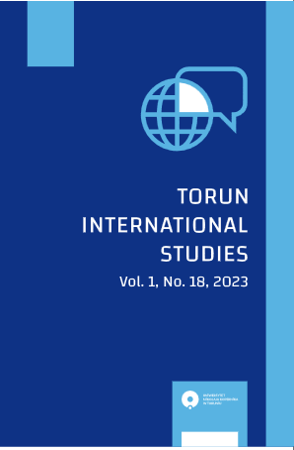REVIEW OF COUNTER-TERRORISM SYSTEMS DURING SUMMER OLYMPIC GAMES IN THE 21ST CENTURY
DOI:
https://doi.org/10.12775/TIS.2023.010Keywords
armed forces, Olympic games, security, strategy, terrorismAbstract
The research results presented in the article pertain to the organization of security systems by the host countries during the Summer Olympic Games in Athens (2004), Beijing (2008), London (2012), and Rio de Janeiro (2016). The central part of the considerations focuses on the complex issue of searching for methods and tools to effectively protect participants of such large mass sports events, not only against terrorists. Taking into account the identified problem situation, it was agreed that the aim of the article will be to characterize the security methods and tools employed by the organizers of the Summer Olympic Games. The research was conducted with the use of selected theoretical scientific methods, including analysis, synthesis, comparison, analogy, generalization, and inference. These methods were applied in a structured way to a research process that focused on case studies of selected Summer Olympic Games that were considered representative samples. The results of the carried out research clearly indicate a high complexity of the security systems created for the needs of the Olympic Games. In every analyzed case, the need occurred to integrate state institutions and international organizations, including various agencies dealing with security issues, including terrorism.
Additionally, based on the obtained results, it was also determined that properly forecasting threats is crucial in ensuring the safety of participants in the Olympic Games. It should be further emphasized that in each analyzed case study, the organizers of these large sports events fulfilled their role as hosts very well. They should, therefore, be recognized as a good example for other countries that will apply for organizing this type of mass sports events in the future. They must also be aware that each sporting event of this type requires a significant organizational and financial effort and that the threats are not limited to terrorism but can be posed by various external and internal factors.
This article is one of the first attempts to assess the justification of implementing various methods and tools to the security systems of mass international sporting events through the prism of their effectiveness. In addition, the proposed solutions, including the threat forecasting methodology, may be useful to both practitioners and theoreticians in creating more effective solutions in the field of national and international security.
References
Anderson, C. (2003, November 3). FBI Chief to Check Olympics Security. Denver Post.
Buzanelli, M. P. (2013). Porque é Necessário Tipificar o Crime de Terrorismo no Brasil. Revista Brasileira de Inteligência, 8, 9–19. https://doi.org/10.58960/rbi.2013.8.101
Chapman, S. (2004, May 19). Terror Drills for Summer Olympics. CBS News. https://ft.cbsnews.com/news/terror-drills-for-summer-olympics/
Clarke, L. (2004, January 17). No Terror Threat to ’04 Games. Washington Post. https://www.washingtonpost.com/archive/sports/2004/01/17/no-terror-threat-to-04-games/3a13a2b8-a6c0-4668-860f-c26be953244d/
Cody, E. (2008, April 29). For Chinese, a Shift in Mood, From Hospitable to Hostile. The Washington Post.
CRS. (2004). Athens Olympics 2004: U.S. Government Involvement in Security Preparations. CRS. https://www.everycrsreport.com/files/20040728_RL32497_b74364fa9ede91fe41f49f49ab6230b1ce219d37.pdf
Dongbo, Z., & Haihua, Z. (2008). Troop Deployment for Olympic Security Has Been Completed.
Eryan, N. (2008, July 15). Analysis of Characteristics of PLA’s Olympic Security. Wen Wei Po. https://www.wenweipo.com/
Faculty of Management in sport, Alfa BK University, Serbia, Šiljak, V., Vukašinović, V., Faculty of Sport and Physical Education University of Belgrade, Serbia, Đurović, D., & Faculty of Management in sport, Alfa BK University, Serbia. (2016). Security Requirements at The Olympic Games. Sportlogia, 12(1), 31–40. https://doi.org/10.5550/sgia.161201.en.SVD
Fussey, P., Coaffee, J., Armstrong, G., & Hobbs, D. (2012). The Regeneration Games: Purity and Security in the Olympic City: The regeneration games. The British Journal of Sociology, 63(2), 260–284. https://doi.org/10.1111/j.1468-4446.2012.01409.x
GAO. (2005). Olympic Security: U.S. Support to Athens Games Provides Lessons for Future Olympics (GAO-05-547). https://www.gao.gov/assets/250/246565.pdf
Garber, G. (2004, August 9). Cost of maximum security: $1.5 billion. ESPN. https://www.espn.com/olympics/summer04/gen/columns/story?id=1856022
Giulianotti, R., & Klauser, F. (2010). Security Governance and Sport Mega-events: Toward an Interdisciplinary Research Agenda. Journal of Sport and Social Issues, 34(1), 49–61. https://doi.org/10.1177/0193723509354042
Giulianotti, R., & Klauser, F. (2012). Sport mega-events and ‘terrorism’: A critical analysis. International Review for the Sociology of Sport, 47(3), 307–323. https://doi.org/10.1177/1012690211433454
Graham, S. (2012). Olympics 2012 security: Welcome to lockdown London. City, 16(4), 446–451. https://doi.org/10.1080/13604813.2012.696900
HM Government. (2010). A Strong Britain in an Age of Uncertainty: The National Security Strategy (Cm 7953). HMSO. https://assets.publishing.service.gov.uk/government/uploads/system/uploads/attachment_data/file/61936/national-security-strategy.pdf
Home Office. (2011). London 2012 Olympic and Paralympic Safety and Security Strategy (No. 404835). COI. https://assets.publishing.service.gov.uk/government/uploads/system/uploads/attachment_data/file/97983/olympic-safety-security-strategy.pdf
Junwu, L. (2008, August 5). Tibet Autonomous Region Successfully Holds Anti-terrorist Real-troop Exercises on 2 and 4 August. Zhongguo Xinwen She.
Karpowicz, J., & Klich, E. (2004). Bezpieczeństwo Lotów i Ochrona Lotnictwa Przed Atakami Bezprawnej Ingerencji. AON.
Mallon, B., & Heijmans, J. (2011). Historical dictionary of the Olympic movement. Scarecrow Press.
Min, W., & Jun, W. (2008, June 26). Shenyang Military Region Air Force’s Olympics Security Mission Units Strengthen Whole System’s Ability to Handle Incidents. Kongjun Bao.
Ministry of Defense. (2010, July). Secure game. Defense Focus.
Mortimer, G. (2011, March 13). Olympics 2012 Airspace Restrictions. SUAS News - The Business of Drones. https://www.suasnews.com/2011/03/olympics-2012-airspace-restrictions/
Mulvenon, J. (2008). The Party Holds the Ring: Civil-Military Relations and Olympic Security. China Leadership Monitor, 26. https://www.hoover.org/sites/default/files/uploads/documents/CLM26JM.pdf
Naval History and Heritage Command. (2017). Commander Sixth Fleet. Naval History and Heritage Command. http://public1.nhhcaws.local/research/library/research-guides/lists-of-senior-officers-and-civilian-officials-of-the-us-navy/commander-sixth-fleet.html
NBC News. (2008, June 24). Beijing gets ground-to-air defense for Olympics. NBC News. https://www.nbcnews.com/id/wbna25351116
NTI. (2004). Greece Deploys Patriot Missiles to Defend Olympics. NTI. https://www.nti.org/gsn/article/greece-deploys-patriot-missiles-to-defend-olympics/
PESI Rio. (2016). Security in the Rio 2016 Olympic and Paralympic Games. Social Communication Secretariat International Area Office of the President of Brazil.
Downloads
Published
How to Cite
Issue
Section
License
Copyright (c) 2023 Daniel Michalski, Adam Marek Radomyski, Paweł Bernat

This work is licensed under a Creative Commons Attribution-NoDerivatives 4.0 International License.
Stats
Number of views and downloads: 805
Number of citations: 0



